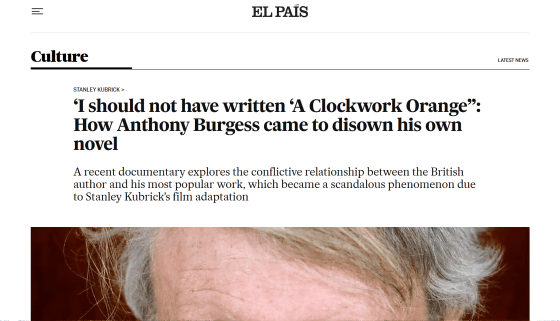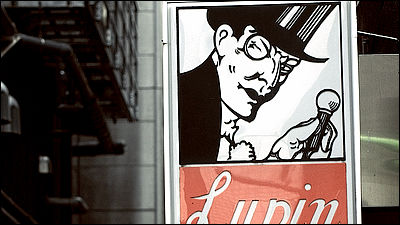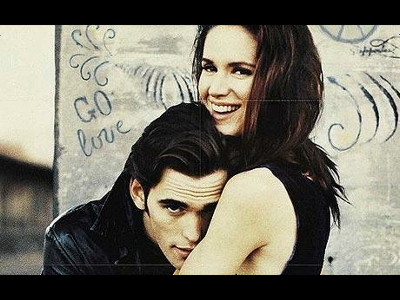Why did Anthony Burgess, the original author of Kubrick's masterpiece movie ``A Clockwork Orange'', regret writing the novel?

by
Anthony Burgess ' science fiction novel `` A Clockwork Orange '' is about Alex, a 15-year-old boy who, along with his friends, repeatedly commits violent crimes and ends up in prison.He undergoes personality correction treatment called Ludovico therapy. It became a world-famous literary work when film director Stanley Kubrick produced a movie of the same name , but the original author, Burgess, later regretted writing it, and the story behind this is that the Spanish major It is compiled by the newspaper El Pais .
'I should not have written 'A Clockwork Orange'': How Anthony Burgess came to disown his own novel | Culture | EL PAÍS English
https://english.elpais.com/culture/2024-01-29/i-should-not-have-written-a-clockwork-orange-how-anthony-burgess-came-to-disown-his-own- novel.html

The movie ``A Clockwork Orange,'' which depicts gruesome violence set against the backdrop of classical music, shocked audiences around the world. In addition, Alex, who undergoes Ludovico therapy and at one point begins to feel physiological aversion whenever he imagines violence or sexual acts, eventually regains his original cruel heart. It had a strong satirical aspect. The title ``A Clockwork Orange'' alludes to the act of applying mechanical morality to living things that have fruit juice or sweetness, similar to how Alex was forcibly transformed into a moral person through Ludovico therapy. About.
After Kubrick's film became a hot topic around the world, newspapers published articles such as ``Police chase gang of rapists in ``A Clockwork Orange'' and ``Children die in war in ``A Clockwork Orange.'''' It seems that there has been an increase in discourse linking the brutal violence and sexual crimes of ``A Clockwork Orange.''
In his biography of British novelist D.H. Lawrence , `` Flame into Being, '' Burgess wrote, ``The misunderstandings (of ``A Clockwork Orange'') will haunt me until the day I die.'' 'I shouldn't have written this book because it risked being misread,' he wrote, comparing it to Lawrence's controversial novel, Lady Chatterley's Lover . ``If a nun gets raped in the Vatican, the newspapers will call me,'' Burgess said, complaining that ``A Clockwork Orange'' made her look like an expert on violence. I'm spilling it. However, Mr. Burgess insisted that the root of the problem was not the novel, but Kubrick's film.
When ``A Clockwork Orange'' was republished in the United States in 1986, the preface stated, ``I first published the novel ``A Clockwork Orange'' in 1962, and it was written in the world's literary memory. It should be enough of a past to be erased,'' he said, pointing out that it was the influence of Kubrick's films that continued to attract the attention of the public. He added, ``For a variety of reasons, I would be happy to dissociate myself from this work.'' ``Unfortunately, my satirical book reeked like a bad egg with the poisonous air of original sin.'' , it was appealing to many people,'' and expressed a negative opinion that the novel itself had no artistic value.

As the movie ``A Clockwork Orange'' became a hot topic, Burgess naturally began to play the role of a publicist for the movie, and even attended several ceremonies. However, these activities exhausted Burgess, and the relationship between Burgess
Also, the main plot of ``A Clockwork Orange'' is the same in both Burgess's original novel and Kubrick's movie, but ``Chapter 21'' in the original novel is the part where Alex changes his mind, whereas in the movie version The big difference is that it doesn't. Even though it is the same novel, the version published in America does not include Chapter 21. Regarding the reason for this, El Pais says, ``The lack of the last part is the result of intervention by the American editor, who wrote that chapter because he believed that the results shown on the previous page were more suggestive.'' I deleted it. Kubrick thought the same way.'
In the film and American versions, it is implied that Alex's Ludovico therapy allowed him to regain his suppressed violent impulses, allowing him to commit crimes again. However, in Chapter 21, which follows, Alex reunites with his former companions who have already started a family, and after reflecting on his life, he decides to leave violence behind. Therefore, the messages that viewers receive are different between the movie version and the original novel.
According to the 2023 documentary film Orange mécanique, les rouages de la violence, an autobiographical manuscript written by Burgess before his death states that the novel's themes glorify crime. It was stated that it was not a thing. 'All works of art are dangerous,' Burgess wrote in the manuscript. 'My little son tried to fly after seeing Disney's Peter Pan . The moment he tried to take off from a fourth-story window. , I grabbed his leg.''

``He didn't like the publicity surrounding the film, and I think it was a subjective reaction,'' said Eduardo Oyarson, a researcher in English literature at Madrid's Complutense University. It has become a popular and cultural phenomenon that has transcended the world. Ask anyone around you how many people can name Anthony Burgess' other books.'
Related Posts:







